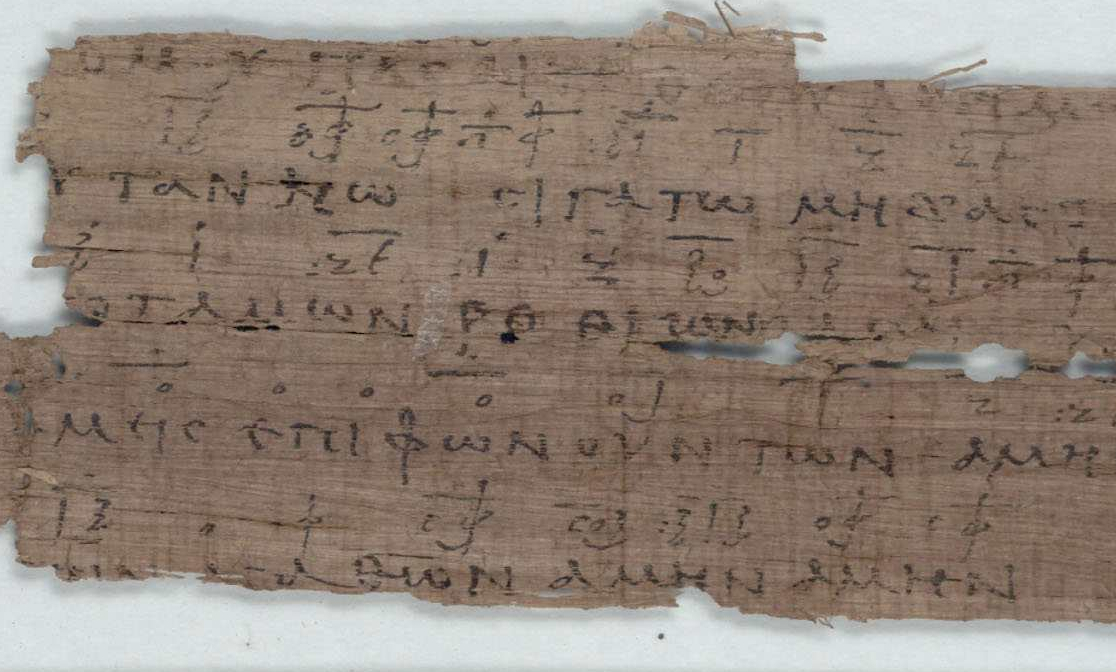Passiontide is a good time for church music. From the triumphal Palm Sunday processionals of ‘All Glory, Laud and Honour’ and ‘Ride On! Ride On in Majesty!’ to the mournful but grateful reflections of ‘My Song is Love Unknown’. From the desperate sadness of ‘O Sacred Head, Sore Wounded’, the tune coming from Bach’s ‘St Matthew Passion’, to the Handel-set pomp of ‘Thine Be The Glory’ on Easter Day.
This Holy Week a new song of praise has arrived. Or rather an ancient one has been revived. In 1918, archaeologists digging on a rubbish dump at Oxyrhynchus in Egypt discovered a tattered piece of papyrus on which was written the earliest surviving Christian Greek hymn that contains lyrics and musical notation.
The scrap, dating from the mid-third century, sat in a library at Oxford for more than a century but has been given new life by an Australian academic, John Dickson, who invited two leading Christian musicians to adapt and perform it. A documentary on their efforts, called The First Hymn Project, has just been released.
Only 35 Greek words remained, beginning with ‘Sigato’, an exhortation to silence. Dickson translated the text as:
‘Let all be silent, the shining stars not sound forth, all rushing rivers be stilled as we sing our hymn to the Father, Son, the Holy Spirit, as all powers cry out in answer: Amen, Amen. Might, praise and glory forever to our God, the only giver of all good gifts. Amen, Amen.’
This invocation of the Trinity predates by a few generations the Council of Nicaea, whose 1,700th anniversary is marked this year, which confirmed the Christian Creed.
‘It’s clear evidence that Christians were singing their Trinitarian beliefs from an early period,’ Dickson said. ‘Despite the external resistance facing the church in the third century, the persecution and perhaps even doubt as to whether the message and their own lives would survive, they sing – what I think is the pinnacle of the hymn – to ‘the only giver of all good gifts.’’
While the hymn was accompanied by notation, it turned out this was music for another, now missing, song. Still, Dickson commissioned the Grammy-winning Christian rock songwriters Chris Tomlin and Ben Fielding to take the music from the missing song and combine it with the hymn lyrics it was found with. The Greek melody, Dickson suggested, was a ‘pub song’ that anyone on the third-century streets would know, perhaps even a pagan song.
Armand D’Angour, an Oxford professor of classics who has specialised in ancient music, said this is the latest surviving piece of Greek notation for the voice, which had emerged in the fifth century BC and used letters to indicate notes, alpha being higher than omega. An earlier notation for instruments, such as the double-pipe and lure, used shapes.
‘It preserved the way something was sung and played rather than acting as a score,’ D’Angour said. ‘Much practice would have been transmitted orally.’ The music on the papyrus was designed to be sung by a chorus, he said, though could have been accompanied.
‘I had no idea that such a significant discovery lay quietly in England,’ Fielding said. ‘Now we were being tasked with bringing it back to life, that the Church today might be able to sing with the very same words our brothers and sisters in Christ were singing 1,800 years ago.’ Tomlin said that they had tried to sing the lyrics ‘in a way that felt really fresh, and today, and singable and powerful’.
There is a lot of conjecture, padding and innovation to their effort, like recreating a woolly mammoth from a few strands of DNA beefed up by essence of elephant. Less resurrection, more inspiration. Is it any good, though? That depends on your taste for guitar-led ‘worship songs’. Fielding and Tomlin are undeniably masters of this field and fans of their style will probably love it. A video of them performing it on YouTube has had 46,000 views in four days.
To those of us who prefer church music to be organ and SATB, it sounds more like a Crowded House B-side. But then all evangelical music does to my ear. The original hymn ‘would not have sounded like that at all,’ D’Angour clarified.
Christianity is a broad church, musically, and whatever makes your spirit soar is what matters. The First Hymn Project is certainly an interesting experiment. But give me ‘Thine Be the Glory’ any day.







Comments